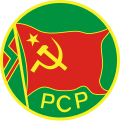Aspect of Portuguese political history
The history of the Portuguese Communist Party (Portuguese: Partido Comunista Português, pronounced [pɐɾˈtiðu kumuˈniʃtɐ puɾtuˈɣeʃ], or PCP), spans a period of 102–103 years, since its foundation in 1921 as the Portuguese section of the Communist International (Comintern) to the present. The Party is still an active force within Portuguese society.
After its foundation, the party experienced little time as a legal party before it was forced underground after a military coup in 1926. After some years of internal re-organization, that adapted the PCP to its new clandestine condition and enlarged its base of support, the party became a force in the opposition to the dictatorial regime[1] led by António de Oliveira Salazar, despite being brutally suppressed several times during the 48 years of resistance and having spent several years with little connection with the Comintern and the World Communist Movement.[2]
After the end of the dictatorship, with the Carnation Revolution in 1974, the party became a major political force within the new democratic regime. Despite being less influential since the fall of the Socialist bloc in eastern Europe, it still enjoys popularity in vast sectors of Portuguese society, particularly in the rural areas of the Alentejo and Ribatejo, and also in the heavily industrialized areas around Lisbon and Setúbal, where it holds the leadership of some municipalities.[3]
- ^ Cunhal, Álvaro (1997). O caminho para o derrubamento do fascismo. Edições Avante!. ISBN 972-550-262-0.
- ^ Rosas, Fernando (dir.) (1997). Revista História (History Magazine) - Number 28 (New Series).
- ^ Câmaras Municipais de Presidência CDU, Portuguese Communist Party, URL accessed 20 June 2006

